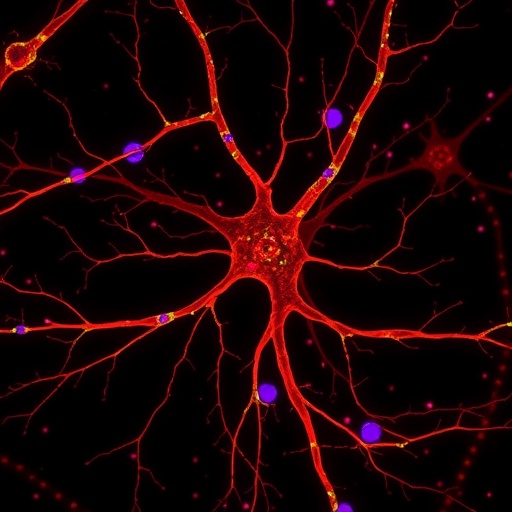In a groundbreaking study led by Luo et al., the intricacies of estrogen signaling within the context of neurodegenerative conditions have been explored, specifically focusing on the role of membrane-associated estrogen receptor α (mERα) in hippocampal neurons. The research reveals a novel aspect of estrogen’s neuroprotective effects, particularly in relation to amyloid β-induced dysregulation of potassium ion channels known as G protein-coupled inwardly rectifying potassium (GIRK) channels. This finding has vast implications for understanding sex-specific responses to neurodegenerative diseases like Alzheimer’s, where the interplay of hormones and neural activity becomes crucial.
The hippocampus is a vital region for memory and learning, often adversely affected by amyloid β plaques prevalent in Alzheimer’s disease. The researchers employed a sophisticated methodology, using female mouse models to examine how mERα might contrive a protective mechanism against the impairment of GIRK channels triggered by amyloid β presence. These channels play a principal role in maintaining neuronal excitability and overall brain health, thus making their regulation key in preventing cognitive decline.
Previous studies have predominantly focused on estrogen’s genomic actions, revealing its capacity to support neuronal survival and function. However, Luo et al. shifted the paradigm by emphasizing the rapid non-genomic effects activated via mERα, demonstrating how estrogen can modulate GIRK channel activity almost immediately upon binding. This insight enhances the scientific community’s grasp of estrogen as an expedient neuroprotectant rather than just a long-term regulator of gene expression.
In their experiments, the researchers infused amyloid β into the hippocampus of female mice, subsequently monitoring the GIRK channel activity through advanced electrophysiological techniques. The results were striking: the presence of mERα was found to prevent the suppression of these channels, asserting that the activation of estrogen receptors may offer a therapeutic angle for combating the deleterious impacts of amyloid β within neural circuits.
Furthermore, the study illustrated that not just any ERα would suffice; the specificity of the membrane-associated variant appeared vital. This specificity reinforces the concept of targeted therapies that might optimize estrogen’s neuroprotective roles while mitigating potential side effects associated with systemic hormone treatments in women, especially during critical periods like menopause when estrogen levels decline.
The analysis extended beyond mere observation. The researchers examined the signaling pathways activated by mERα, identifying a cascade involving G proteins and downstream effectors that ultimately enhance GIRK channel function. This pathway elucidation provides a robust framework for future drug development, aiming to harness these mechanisms in clinical settings targeting neurodegenerative disorders.
The implications of these findings are profound, especially considering the increasing prevalence of Alzheimer’s disease and related dementias. Understanding that estrogen can exert protective effects through mERα opens new avenues for gender-specific therapeutic interventions in neurodegenerative diseases, which often present differently in women compared to men.
Moreover, given the statistical likelihood of women developing Alzheimer’s at a higher rate, the research stresses the urgency of studying sex differences in disease mechanisms. It underscores a need for newer models in neuroscience that prioritize diversity in research subjects, probing how differing sex hormones interact with neurobiological systems and contribute to variations in disease pathology.
Luo and colleagues’ work presents a seminal shift, focusing attention on mERα as a potential pharmacological target. The prospect of designing compounds that selectively activate this receptor could revolutionize treatment paradigms for women facing cognitive decline associated with aging and neurodegeneration.
The researchers concluded that these findings pave the pathway for future research into mERα-targeted therapies. They anticipate that such approaches could not only mitigate the impact of neurodegenerative diseases but also enhance our understanding of estrogen’s role in broader neurobiological processes, including neurogenesis and synaptic plasticity.
In summary, this innovative study by Luo et al. is not just a leap in neurobiology; it reshapes the conversation about women’s health in neurological contexts. As we delve deeper into the complexities of hormone-receptor interactions and their biological ramifications, we uncover promising strategies that could alter the trajectory of neurodegenerative diseases in women, leading to enhanced quality of life and cognitive health.
As we embark on further exploration of these mechanisms, the promise of new therapeutic pathways becomes increasingly tangible. The collaboration between endocrinology and neurobiology illustrated by this research serves as a model for interdisciplinary approaches, encouraging a comprehensive understanding of how our hormones interact with our neural systems, cultivating a hopeful future for targeted interventions in cognitive health.
The full implications of Luo et al.’s findings will surely resonate well beyond the confines of academic discourse, igniting conversations about prevention, treatment, and the importance of nuanced approaches in tackling aging-related cognitive disorders, signifying a pivotal moment in the intersection of gender, neurobiology, and medicine.
Subject of Research: The role of membrane-associated estrogen receptor α in preventing amyloid β-induced suppression of GIRK channel activity in hippocampal neurons.
Article Title: Membrane-associated estrogen receptor α prevents the amyloid β-induced suppression of GIRK channel activity in hippocampal neurons from female mice.
Article References:
Luo, H., Marron Fernandez de Velasco, E., Kim, J. et al. Membrane-associated estrogen receptor α prevents the amyloid β-induced suppression of GIRK channel activity in hippocampal neurons from female mice.
Biol Sex Differ 16, 90 (2025). https://doi.org/10.1186/s13293-025-00776-7
Image Credits: AI Generated
DOI: https://doi.org/10.1186/s13293-025-00776-7
Keywords: estrogen receptor α, amyloid β, GIRK channel, hippocampal neurons, cognitive decline, neurodegenerative diseases, Alzheimer’s disease, sex differences, neuroprotection, electrophysiology.




